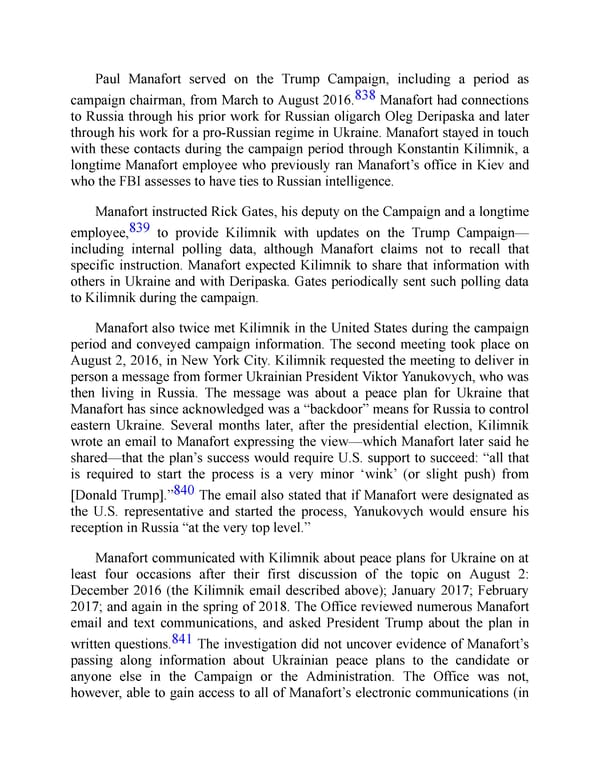Paul Manafort served on the Trump Campaign, including a period as 838 campaign chairman, from March to August 2016. Manafort had connections to Russia through his prior work for Russian oligarch Oleg Deripaska and later through his work for a pro-Russian regime in Ukraine. Manafort stayed in touch with these contacts during the campaign period through Konstantin Kilimnik, a longtime Manafort employee who previously ran Manafort’s office in Kiev and who the FBI assesses to have ties to Russian intelligence. Manafort instructed Rick Gates, his deputy on the Campaign and a longtime 839 employee, to provide Kilimnik with updates on the Trump Campaign— including internal polling data, although Manafort claims not to recall that specific instruction. Manafort expected Kilimnik to share that information with others in Ukraine and with Deripaska. Gates periodically sent such polling data to Kilimnik during the campaign. Manafort also twice met Kilimnik in the United States during the campaign period and conveyed campaign information. The second meeting took place on August 2, 2016, in New York City. Kilimnik requested the meeting to deliver in person a message from former Ukrainian President Viktor Yanukovych, who was then living in Russia. The message was about a peace plan for Ukraine that Manafort has since acknowledged was a “backdoor” means for Russia to control eastern Ukraine. Several months later, after the presidential election, Kilimnik wrote an email to Manafort expressing the view—which Manafort later said he shared—that the plan’s success would require U.S. support to succeed: “all that is required to start the process is a very minor ‘wink’ (or slight push) from 840 [Donald Trump].” The email also stated that if Manafort were designated as the U.S. representative and started the process, Yanukovych would ensure his reception in Russia “at the very top level.” Manafort communicated with Kilimnik about peace plans for Ukraine on at least four occasions after their first discussion of the topic on August 2: December 2016 (the Kilimnik email described above); January 2017; February 2017; and again in the spring of 2018. The Office reviewed numerous Manafort email and text communications, and asked President Trump about the plan in 841 written questions. The investigation did not uncover evidence of Manafort’s passing along information about Ukrainian peace plans to the candidate or anyone else in the Campaign or the Administration. The Office was not, however, able to gain access to all of Manafort’s electronic communications (in
 Mueller Report PDF Page 148 Page 150
Mueller Report PDF Page 148 Page 150